BusinessEurope Headlines No. 2018-21
Agreement on multiannual financial framework essential before European Parliament elections

Speaking at the Annual Conference of Federchimica on 4 June in Milan, BusinessEurope President Emma Marcegaglia stressed that in Europe there is a need to concentrate efforts on improving our competitiveness. Concerning the post-2020 multiannual financial framework (MFF), she said: “For this to happen, it is essential that a swift agreement is reached before the European Parliament’s elections in May 2019. If we look at other major economies, the US are moving on with a major tax reform and China is implementing the Belt and Road Initiative”. Participating at a roundtable session with the President of the European Parliament Antonio Tajani and the President of Confindustria Vincenzo Boccia, Marcegaglia added that “we cannot afford delays in powerful investment incentives. It is also key to get regulatory frameworks right to encourage companies to invest”.
Contact: Daniele Olivieri
Photo copyright: Federchimica
Video message on Horizon Europe research and innovation programme
Our Director General Markus J. Beyrer comments on the recently published proposal for the research and innovation programme Horizon Europe and its importance for business.
Our comment
Is this the start of a new world trade order?
By Luisa Santos, Director, International Relations Department
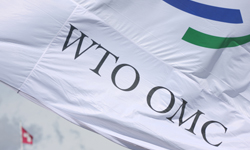 It feels like riding a roller-coaster if you are dealing with trade these days. It is difficult to follow all the daily developments and nobody is quite sure when and how they will end. Instead of a predictable and rules-based environment we are now witnessing disruption that poses a risk to the existing world trade order.
It feels like riding a roller-coaster if you are dealing with trade these days. It is difficult to follow all the daily developments and nobody is quite sure when and how they will end. Instead of a predictable and rules-based environment we are now witnessing disruption that poses a risk to the existing world trade order.
Quo vadis? Is this the start of a new trading system, less open and even going against existing business models anchored in global value chains? Are we seeing a backlash against globalisation coming from the top, from the country that has initiated it and mostly gain from it? It is a fact that the recent decisions from the U.S. Administration are shaking the system and putting it to a test.
Using national security grounds to introduce additional tariffs or limit imports was not our daily bread. The possibility is foreseen by the World Trade Organisation (WTO) but it has been rarely used for three main reasons. First, the measure was foreseen for very exceptional circumstances, namely when a country is facing an external threat and some emergency actions need to be taken to protect the economy. Second, this measure will potentially hurt parts of your business and consumers that will have to pay more for the products. Third, the measure will likely trigger similar reactions from your trading partners.
In the case of the additional duties imposed on steel and aluminium, we are seeing already a price increase in the U.S. market and the main U.S. trading partners have announced that they would take rebalancing measures hitting U.S. imports with additional tariffs. In parallel, the WTO has received a number of complaints against the U.S. measures and the verdict will be extremely important for the future of the world trade order. But will the WTO react in a reasonable period of time and prevent major disruptions in the multilateral trading system?
The U.S. Administration has been blocking for months the appointment of judges to the appellate body of the WTO, putting in question the whole dispute settlement mechanism. The increase in disputes will put the system under additional strain. Business needs a stable and predictable environment to operate. It needs rules and efficient ways to enforce them. Clearly, the current situation is not ideal and if it lasts it will have an impact on companies’ business models and investment decisions.
The existing world trade order is not perfect and we all agree it needs reform. The turmoil created by the U.S. decisions can have a positive spin if it contributes to improve the system. This will depend on the U.S., but also on the EU and other key trading partners, including China. We can be witnessing the start of an improved world trade order if everyone acts responsively.
Contact: Luisa Santos
EU and Australia building a positive case for trade
 The first official round of the free trade negotiations between the EU and Australia is foreseen for early July. Ahead of the discussions, BusinessEurope Director General Markus J. Beyrer met with the Australian Ambassador to the EU Justin Brown to discuss the main priorities and expectations of European business. “In these challenging times when many are resorting to protectionism and unilateralism, like-minded partners like the EU and Australia need to make a positive case for trade. By concluding ambitious and modern trade agreements we are bettering international trading rules while committing to free and fair trade”, Beyrer said. There are some challenges ahead of these negotiations in important areas like public procurement, geographical indications and agriculture. Both the EU and Australia believe in rules-based trade and are eager to work together in making the world trading system more effective. “Despite the challenges, Australia and the EU should be able to successfully negotiate an agreement that can be positive for both sides, bringing our bilateral relation a step further”, Beyrer added.
The first official round of the free trade negotiations between the EU and Australia is foreseen for early July. Ahead of the discussions, BusinessEurope Director General Markus J. Beyrer met with the Australian Ambassador to the EU Justin Brown to discuss the main priorities and expectations of European business. “In these challenging times when many are resorting to protectionism and unilateralism, like-minded partners like the EU and Australia need to make a positive case for trade. By concluding ambitious and modern trade agreements we are bettering international trading rules while committing to free and fair trade”, Beyrer said. There are some challenges ahead of these negotiations in important areas like public procurement, geographical indications and agriculture. Both the EU and Australia believe in rules-based trade and are eager to work together in making the world trading system more effective. “Despite the challenges, Australia and the EU should be able to successfully negotiate an agreement that can be positive for both sides, bringing our bilateral relation a step further”, Beyrer added.
Contact: Eleonora Catella
Female entrepreneurs for growth, jobs and sustainable development in Africa
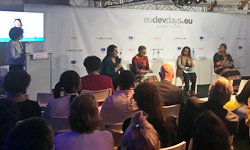 Summing up a panel discussion on “Women in business: the African perspective”, during the European Development Days 2018 on 5 June, BusinessEurope Director for International Relations Luisa Santos stated that “the economic empowerment of women is key for growth, jobs and sustainable development in Africa. To support female entrepreneurs, EU-Africa cooperation must shift from an aid-centred approach to an approach focusing on business development.” During the panel, businesswomen from different parts of Africa and the EU talked about their success stories and the challenges they faced when setting up their businesses in the region. Santos moderated the discussion, which included the participation of representatives of the European Investment Bank (EIB), the minister for small and medium-sized enterprises of the Government of South Africa, the European Commission Directorate General for Development and Cooperation and the African Union Commission.
Summing up a panel discussion on “Women in business: the African perspective”, during the European Development Days 2018 on 5 June, BusinessEurope Director for International Relations Luisa Santos stated that “the economic empowerment of women is key for growth, jobs and sustainable development in Africa. To support female entrepreneurs, EU-Africa cooperation must shift from an aid-centred approach to an approach focusing on business development.” During the panel, businesswomen from different parts of Africa and the EU talked about their success stories and the challenges they faced when setting up their businesses in the region. Santos moderated the discussion, which included the participation of representatives of the European Investment Bank (EIB), the minister for small and medium-sized enterprises of the Government of South Africa, the European Commission Directorate General for Development and Cooperation and the African Union Commission.
Contact: Benedikt Wiedenhofer
An ambitious budget for research and innovation programme Horizon Europe
 “We count on leaders to give a clear political signal that Europe will be at the forefront of the global innovation race”, wrote Emma Marcegaglia, President of BusinessEurope, in a letter to Donald Tusk, President of the European Council, ahead of the EU summit in the end of June. The letter also highlights that countries around the world are investing massively in research and innovation. This is intensifying global competition for innovative solutions. “The post-2020 research and innovation programme Horizon Europe is a unique opportunity to deepen Europe’s innovation capability and to ensure the necessary investments”, Marcegaglia wrote, adding that the European Commission’s proposal is not ambitious enough to fill the gap of €150 billion a year to reach the EU’s own 3% of GDP of investment in research and development target.
“We count on leaders to give a clear political signal that Europe will be at the forefront of the global innovation race”, wrote Emma Marcegaglia, President of BusinessEurope, in a letter to Donald Tusk, President of the European Council, ahead of the EU summit in the end of June. The letter also highlights that countries around the world are investing massively in research and innovation. This is intensifying global competition for innovative solutions. “The post-2020 research and innovation programme Horizon Europe is a unique opportunity to deepen Europe’s innovation capability and to ensure the necessary investments”, Marcegaglia wrote, adding that the European Commission’s proposal is not ambitious enough to fill the gap of €150 billion a year to reach the EU’s own 3% of GDP of investment in research and development target.
![]() Contact: Alexandre Affre
Contact: Alexandre Affre
CEOs: EU research programmes matter for companies
 On the day of publication of the research and innovation programme Horizon Europe proposal, on 7 June, BusinessEurope published an updated version of the CEOs statement “EU research and innovation funding programmes matter for companies!”. More leading business voices have now joined the call and state that R&I funding programmes at EU level are decisive in financing projects with a clear and strong EU-added value. The programmes also have an extensive track record in the promotion and facilitation of a collaborative approach with all stakeholders linked to the R&I value chain. In addition, they support access to the research community and excellence. The commitment of companies to these programmes is equally important to make them successful and ultimately to bring benefits to society at large.
On the day of publication of the research and innovation programme Horizon Europe proposal, on 7 June, BusinessEurope published an updated version of the CEOs statement “EU research and innovation funding programmes matter for companies!”. More leading business voices have now joined the call and state that R&I funding programmes at EU level are decisive in financing projects with a clear and strong EU-added value. The programmes also have an extensive track record in the promotion and facilitation of a collaborative approach with all stakeholders linked to the R&I value chain. In addition, they support access to the research community and excellence. The commitment of companies to these programmes is equally important to make them successful and ultimately to bring benefits to society at large.
![]() Contact: Jan Bambas
Contact: Jan Bambas
Embracing digitalisation to achieve economic and social progress
 “Technology is an important driver of economic growth, job creation and productivity improvements. For Europe to fully reap the benefits of digitalisation, progress is needed towards more responsive labour markets, education and skills training, and social protection systems. Social partnership at all the appropriate levels has an important role to support enterprises performance by mobilising human potential in a way that is suited to changing jobs and tasks on the labour markets”. This was the key message by Maxime Cerutti, BusinessEurope Director for Social Affairs, at a conference on the digital economy that was organised by Economiesuisse on 5 June in Brussels. He added that a key challenge is to make quick progress to better meet growing digital skills needs across the economy. This requires investments and cooperation between governments, social partners and companies to make the best possible use of new technologies in education and training both in terms of the learning process and to improve learning outcomes.
“Technology is an important driver of economic growth, job creation and productivity improvements. For Europe to fully reap the benefits of digitalisation, progress is needed towards more responsive labour markets, education and skills training, and social protection systems. Social partnership at all the appropriate levels has an important role to support enterprises performance by mobilising human potential in a way that is suited to changing jobs and tasks on the labour markets”. This was the key message by Maxime Cerutti, BusinessEurope Director for Social Affairs, at a conference on the digital economy that was organised by Economiesuisse on 5 June in Brussels. He added that a key challenge is to make quick progress to better meet growing digital skills needs across the economy. This requires investments and cooperation between governments, social partners and companies to make the best possible use of new technologies in education and training both in terms of the learning process and to improve learning outcomes.
Contact: Robert Plummer
Trade agreements as a tool to improve the global competition framework
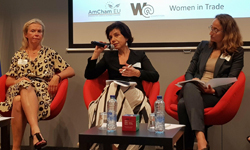
“Fair competition should go hand in hand with market opening, so that European business can take full advantage of trade and investment liberalisation”, said Luisa Santos, Director for International Relations at BusinessEurope, at the event Women in Trade Talk at the American Chamber of Commerce to the EU (AmCham) on 6 June. During a discussion on competition clauses in trade agreements, she stated that BusinessEurope supports the relaunch of initiatives on trade and competition at multilateral level, but the most pressing issue currently is to develop clear and comprehensive competition clauses in trade agreements. Finally, Santos welcomed the efforts to improve the global competition framework through this means, which will help shape a rules-based trading system.
Contact: Luisa Santos
Private sector plays fundamental role in sustainable development
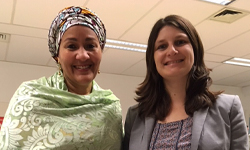 The private sector’s contribution to achieving sustainable economies and societies and the implementation of the UN Sustainable Development Goals should be clearly acknowledged and promoted. This was the main message of Rebekah Smith, Deputy Director for Social Affairs to the UN Deputy Secretary-General, Amina J. Mohammed, during a meeting on 5 June. Smith emphasised that companies increasingly put sustainability at the core of their business strategies and that to support business, “the EU must approach sustainability in line with its need to remain globally competitive”. She also highlighted the role of the EU in mobilising others around the world on the sustainability agenda, including fostering private sector investment in developing countries.
The private sector’s contribution to achieving sustainable economies and societies and the implementation of the UN Sustainable Development Goals should be clearly acknowledged and promoted. This was the main message of Rebekah Smith, Deputy Director for Social Affairs to the UN Deputy Secretary-General, Amina J. Mohammed, during a meeting on 5 June. Smith emphasised that companies increasingly put sustainability at the core of their business strategies and that to support business, “the EU must approach sustainability in line with its need to remain globally competitive”. She also highlighted the role of the EU in mobilising others around the world on the sustainability agenda, including fostering private sector investment in developing countries.
Contact: Rebekah Smith
Another step closer to the free flow of data
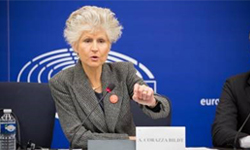 The Internal Market and Consumer Protection Committee (IMCO) in the European Parliament voted through Anna-Maria Corazza Bildt’s report on the free flow of data on Monday 4 June. This is a positive sign for the future of Europe’s data economy. Data is borderless by nature but national restrictions often force it to be geographically localised in a certain place. If national restrictions on its free movement are removed, Europe’s data economy has the potential to be worth some 739 billion euros (or 4% EU GDP) by 2020. IMCO also supported covering a broad scope of data to maximise the societal benefits of this proposal. This has the potential to improve healthcare, transport, energy efficiency and public services. At the same time, codes of conduct will be drawn up to encourage a more competitive cloud market and as a result easier cloud switching for business users in the fight against vendor lock-in. Following the full plenary vote at the end of this month, trilogues will begin on 14 June. BusinessEurope is committed to ensure the proposal remains ambitious and calls on the European Council to include public sector data within the remit of the final deal. If this can be achieved, this proposal has the possibility of being a central delivery by this legislature for the Digital Single Market.
The Internal Market and Consumer Protection Committee (IMCO) in the European Parliament voted through Anna-Maria Corazza Bildt’s report on the free flow of data on Monday 4 June. This is a positive sign for the future of Europe’s data economy. Data is borderless by nature but national restrictions often force it to be geographically localised in a certain place. If national restrictions on its free movement are removed, Europe’s data economy has the potential to be worth some 739 billion euros (or 4% EU GDP) by 2020. IMCO also supported covering a broad scope of data to maximise the societal benefits of this proposal. This has the potential to improve healthcare, transport, energy efficiency and public services. At the same time, codes of conduct will be drawn up to encourage a more competitive cloud market and as a result easier cloud switching for business users in the fight against vendor lock-in. Following the full plenary vote at the end of this month, trilogues will begin on 14 June. BusinessEurope is committed to ensure the proposal remains ambitious and calls on the European Council to include public sector data within the remit of the final deal. If this can be achieved, this proposal has the possibility of being a central delivery by this legislature for the Digital Single Market.
Contact: Patrick Grant
Screening of FDI: achieving balance between security and public order objectives and an open environment to investments
 This week, BusinessEurope adopted its position paper on the screening of foreign direct investment (FDI) into the EU, assessing the proposal of the European Commission and taking into account the currently on-going debate among policy-makers and institutions. BusinessEurope Director General Markus J. Beyrer stated: “For BusinessEurope, it is important that such an EU framework respects the balance between achieving legitimate security and public order objectives, while maintaining an open environment to FDI that is a major contributor to jobs and growth in the EU.” For this reason, the scope of the framework for FDI screening should be well defined and limited, avoiding a recourse to protectionism. The position paper also discusses the cooperation mechanism between the EU and the Member States, sought to be established by the Commission’s proposal. In this context, BusinessEurope calls for the effective protection of commercially sensitive information and the launch of an active dialogue with business.
This week, BusinessEurope adopted its position paper on the screening of foreign direct investment (FDI) into the EU, assessing the proposal of the European Commission and taking into account the currently on-going debate among policy-makers and institutions. BusinessEurope Director General Markus J. Beyrer stated: “For BusinessEurope, it is important that such an EU framework respects the balance between achieving legitimate security and public order objectives, while maintaining an open environment to FDI that is a major contributor to jobs and growth in the EU.” For this reason, the scope of the framework for FDI screening should be well defined and limited, avoiding a recourse to protectionism. The position paper also discusses the cooperation mechanism between the EU and the Member States, sought to be established by the Commission’s proposal. In this context, BusinessEurope calls for the effective protection of commercially sensitive information and the launch of an active dialogue with business.
![]() Contact: Sofia Bournou
Contact: Sofia Bournou
Calendar
- 8-9 June: G7 Summit in Canada
- 13 June: 'EU for Talanoa' conference
Reminder: please take a look at our revised privacy policy